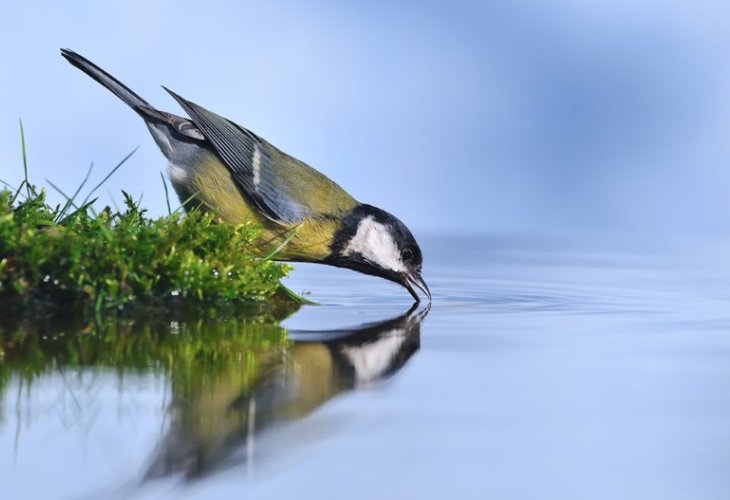What Precious Organs Are Hidden Inside a Safe? 5 Points to Ponder
What I learned from visiting a maternity ward and a nursing home, and what I learned from the Galaxy 6? What chemical factory exists in our body, and what is the source of a bird's beak design?

"Safe"
People who possess valuable items, such as money and jewelry, ensure they are kept in secure and safe places - a safe or bank - to prevent damage. This makes sense, given these items are of great value and it would be a shame to lose them, right?
So then, which organs in our body are the "most precious" for our functioning? It's easy to understand that they are the brain, heart, and lungs. Have you noticed that these organs are located in a special "safe" that protects them?

What "safe" am I talking about?
The brain is protected by the skull, shielding it from injury.
The heart and lungs are protected by the ribs, whose role is to guard the lungs, heart, and major blood vessels.
Is it a coincidence that such vital organs receive such tight and serious protection? Clearly, there is design and thought here. So who appointed and designed such perfect protection for these important organs?
Lesson of Life
Yesterday I received a life lesson:
In the morning, I visited a maternity ward where a relative gave birth to a son. I was exposed to many infants there. Towards evening, I visited my dear grandmother at a nursing home and saw many elderly men and women.
One day - a similar picture, different ages.
It's hard to grasp, but all the elderly people I saw, with their white hair, thin and withered skin, wrinkles, bent body, and measured walk - all, without exception, were once babies! Conversely, all the tender and sweet infants, with their fresh and delightful appearance - are destined to become like the elderly I saw at the nursing home!

If we observe, we will discover that the process of growth and development of our bodies over the years is amazing and astonishing: infancy, childhood, adolescence, adulthood, and old age. It is not merely an anatomical and biological development, but also psychological, cognitive, emotional, and social development, which are direct or indirect results of physical development.
How much time passes from the first stage to the last? Today, the developmental processes in humans generally span about 80 years, and that's it, everything ends... life is short! We arrive in the world as an incredible wonder and leave it as no less amazing a wonder - a process where the soul "leaves" the body...
So what is our purpose in this world? Are we making proper use of our brief stay in this world?
Chemical Factory
Our body is wonderfully connected in a network of nerves, which connect all the cells in our body to the brain to transmit information between all the different areas. For example, the brain gives a "command" for the right leg to move - there is a need for connecting substances ("neurotransmitters"), ensuring the transmission of nerve information in the body.
What are those chemical substances in our body? Here are examples:
Acetylcholine: Responsible for muscle contraction;
Dopamine: Its release creates intense sensations of pleasure;
Serotonin: Mood regulation - low amounts are linked to feelings of depression.
Where did these chemical substances come from, each with its specific and unique role? Who is it that "concocted" the chemical composition that helps our health and functioning? Who maintains the perfect chemical balance of these substances in our body, preventing a "short circuit" in our body every second?
Is it possible that this amazing process, indicating a guiding and caring hand, created itself without a creator and planner?...
Observing the human body allows us to understand that it involves a superhuman creator with infinite genius and tremendous powers...
Bird's Beak
All birds have a beak, which helps them obtain food, and most use the beak alone to grasp and hold their food. From a superficial look, it seems that all birds have the same beak structure, but notice this:
Every bird has a beak designed with amazing precision according to the type of food it eats:
A long, narrow beak, like that of a hoopoe, is suitable for searching for insects and worms in the ground.
A short and thick beak, like that of a sparrow, is suitable for eating seeds.
A broad and flat beak, like that of a duck, is suitable for filtering food from water.
A curved beak, like that of an eagle, is suitable for tearing meat from prey.
And there are many more examples...
It is impossible not to see that the structure of the beak is planned down to the smallest detail, with perfect matching between two different systems - the living and the plant! Doesn't this fact alone suffice to understand that one planner and creator designed and created them all, and that they couldn't have created themselves?
Wonders of the World
My friend recently bought a phone - the latest Galaxy 6 on the market. He couldn't stop raving about the display quality and the amazing range of functions it had. He told all his friends and family how amazing the phone was and how wonderfully it was designed. He spent hours upon hours just trying to understand how the phone worked, and who the genius was that invented this phone, which changed his life completely...

Note, every person who sees a particular attractive object is amazed by its beauty, structure, or function, and is interested in knowing who created it, how it was made, and how it operates? Not only that, but they also make sure to publicize the wonder they have encountered... Incidentally, not only with objects: parents with a new baby, for example, are thrilled with the baby and work hard to tell everyone around them about the wonder they have...
My question is this: why, then, are there people who see the beauty of the world, its vastness, and depth, and do not ask: who created the world? Who created the sun and the moon? Who designed the human body? Who created and planned all the animals, birds, and fish? Is the world we live in not complex and well-planned enough? Could everything that was created in the world have developed on its own, just like that without thought and without planning?...
When a person contemplates the works of the Creator, and his great and wondrous creations, then they will see in them wisdom without end. I don't expect an atheist to rush to the nearest store and buy a tzitzit, but I would expect an intelligent person to research, delve into, and inquire as much as they can, about who is responsible for the meticulously planned and wonderful world we live in, whatever the conclusions may be...

